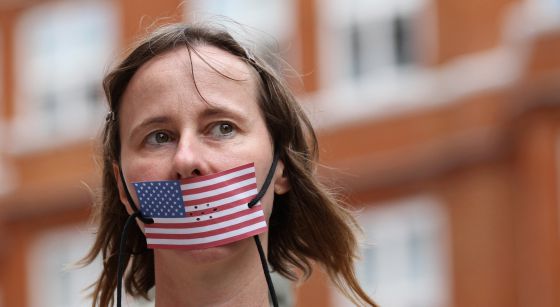
On Aug. 19, North American diplomacy downright rejected Julian Assange’s accusations about Washington having organized a “witch hunt” against him and the website WikiLeaks. In a press conference, Spokesperson of the Department of State Victoria Nuland criticized Assange’s “wild assertions” that, according to her, just try to draw attention away from the trial for sexual assault that awaits him in Sweden. The U.S. assures that it has nothing to do with Assange’s possible extradition from the U.K. to Sweden, or with his open cases in other countries.
Until today American government has channeled the case of leaking military and diplomatic reports in the WikiLeaks site only judicially — the military trial of the soldier Bradley Manning, accused of stealing and distributing 700,000 secret documents from the Pentagon’s secret networks. In the trial, Julian Assange has barely been mentioned, without much attention paid to his statements. Meanwhile, the criminal searches from a Grand Civil Jury in Virginia haven’t caused any pressing of charges.
On Aug. 12, the WikiLeaks founder, however, tried to put himself in American diplomacy’s spotlight by referring to a “witch hunt” against his organization by the Obama administration. Furthermore, Assange said “Bradley Manning must be released.” “If Bradley Manning really did as he is accused, he is a hero and example to us all,” he added, in a speech from the Ecuadorian Embassy in London.
The soldier Manning has been in preventive prison for 818 days now, the majority of which he has spent in isolation. He now shares the unit with other inmates at a base in Kansas. The war council will formally start in a month, on Sept. 21. The hearings started in Dec. 2011, during which the defense asked for the nullity of the trial.
The main defense of Manning’s lawyer, David Coombs, is that his client suffers from psychological disturbances due to latent transexuality. The expert has avoided turning Manning’s case into a cause for freedom of speech, like Assange did. His statements have emphasized that the Army should have suspended Manning for erratic behavior before the leaks happened.
Manning’s lawyer only referred to Assange on one occasion, during the first hearing. He said that he suspected that the soldier could reach an agreement to lower his sentence if he testified against the WikiLeaks founder. The military prosecutor, on the other hand, referred to Assange tangentially, like an accomplice needed for Manning to leak the stolen documents. But the responsibility of the subtraction was held entirely against the soldier.
Assange also spoke about the possible trial against WikiLeaks collaborators. “The United States must vow that it will not seek to prosecute our staff or our supporters. The United States must pledge before the world that it will not pursue journalists for shining a light on the secret crimes of the powerful,” he said. So far the Grand Civil Jury, in charge of investigating the leak, has not been charged. Their task is to determine if there is enough evidence to press charges against him, and for that they have summoned Manning’s acquaintances and other people implicated in the case, like the hacker that blew the whistle.
Assange’s biggest fear, according to what he explained, is that the U.S. will finally decide to press charges and ask for his extradition to Sweden. His attempts at turning Manning’s trial into a governmental aggression toward freedom of speech didn’t quite work in the U.S. A small group of activists supports Manning, with sporadic protests and modest demonstrations at the gates of the Maryland base where he is being judged. On Aug. 17, for example, around 60 people barged into Barack Obama’s campaign offices in Oakland, California, to ask for the soldier’s freedom, without having any major repercussions.

Leave a Reply
You must be logged in to post a comment.